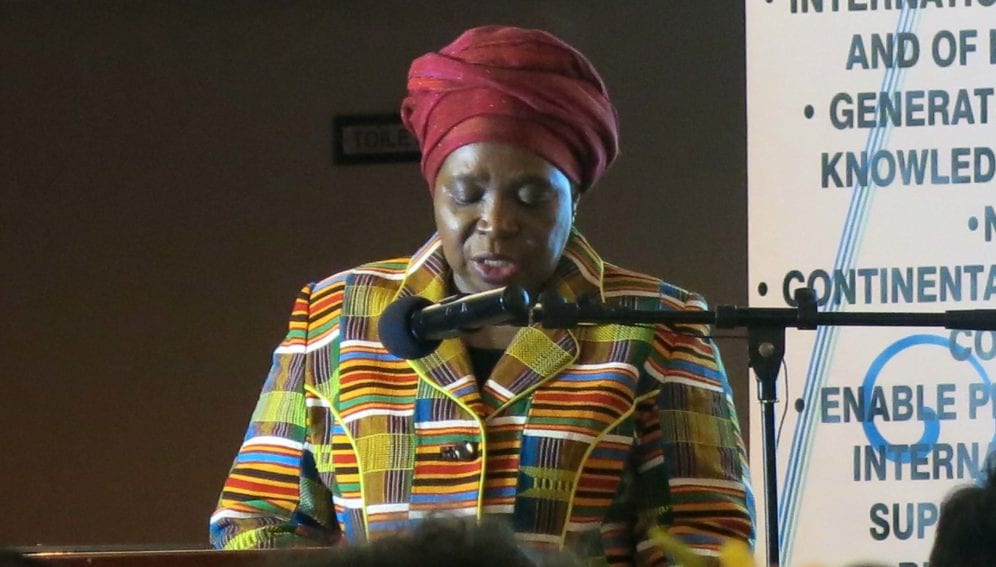By: Imogen Mathers
Send to a friend
The details you provide on this page will not be used to send unsolicited email, and will not be sold to a 3rd party. See privacy policy.
[PRETORIA] “How is research contributing to improving lives? There is never a good link [made] between how that intellectual capacity translates into real issues, real development and the real saving of lives.”
These words, from Jane Kengeya-Kayondo, special advisor for Africa at the Wellcome Trust, captured the tenor of a lively day of discussions in Pretoria yesterday. Her remarks came during a conference on doctoral programmes in Sub-Saharan Africa, organised by the Carnegie Corporation of New York and South Africa’s National Research Foundation (NRF).
Myriad issues were fiercely scrutinised: from how to expand and sustain excellence in African PhDs within the contexts of scarce resources and global competitiveness, to the fundamental question of what purpose — or purposes — doctorates across the continent should actually serve.
But one apparent dichotomy appeared to dominate the discussions. Does the old adage of education for education’s sake still hold water in countries where government funding and donor support are increasingly tied to more tangible ‘outputs’? Or should the spotlight shift towards shoring up mechanisms for drawing out the complex links between PhDs and national, regional and continent-wide development in Africa?
The message that emerged was that, despite the challenges of resource competition and the multiple demands of development, there should and could be space for both: PhDs characterised by pure research, and those geared more towards demonstrable development outcomes.
Both could have a transformative impact. And, indeed, as many speakers argued, creating a sense of binary opposition between them was not necessarily constructive or representative of the richly multifaceted content and value of degrees.
But, for a multitude of reasons, there does need to be a realignment of thinking around African doctoral programmes, some at the meeting thought.
“Creating a space to bring together the multiple voices and concerns of different academics, institutions and social contexts is an invaluable step on the road towards redrawing doctoral programmes in Africa — and reconfiguring how they are linked to the wider demands of development.”
Imogen Mathers, SciDev.Net
According to Cheryl de la Rey, vice-chancellor of the University of Pretoria, one reason is the reality that “most students are more interested in their PhD as it relates to industry, not for the sake of academic study”.
She said that such a rethinking would need to be underpinned by an urgent recognition of the changing nature of research; with higher education increasingly characterised by the expansion of large-scale university networks, the rise of big data, the growth of international collaboration and interdisciplinary study, and the increasing involvement of industry in the research sector.
Priorities for such realignment might include: the need to increase the quantity of PhDs without sacrificing their quality or the level of supervision, and the importance of nurturing old and new university networks at local, regional and continental level to enable shared access to expertise, infrastructure and equipment, particularly in the technology-heavy science subjects.
PhD ‘critical mass’ — the wealth of the continent’s research — should also be linked into local, regional and international networks. They should also focus on ensuring that PhDs in Africa are doing globally significant work, the meeting heard.
Creating a space to bring together the multiple voices and concerns of different academics, institutions and social contexts is an invaluable step on the road towards redrawing doctoral programmes in Africa — and reconfiguring how they are linked to the wider demands of development.
The next step — and the focus of day two of the Carnegie/NRF conference — is ensuring that this new thinking on doctoral education is captured and synthesised, so that it can be communicated to governments and other bodies involved in higher education and policy, enabling the translation of strong ideals into action and lasting change.
This is part of the Africa’s PhD Renaissance series funded by the Carnegie Corporation of New York.














